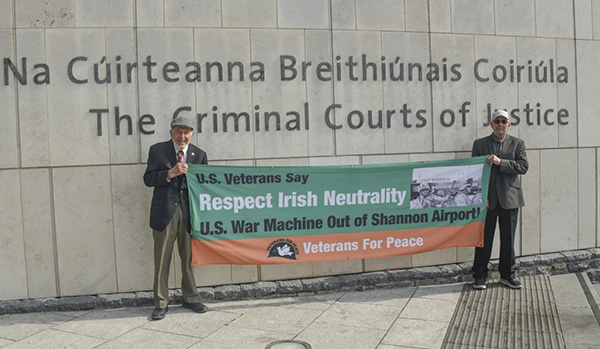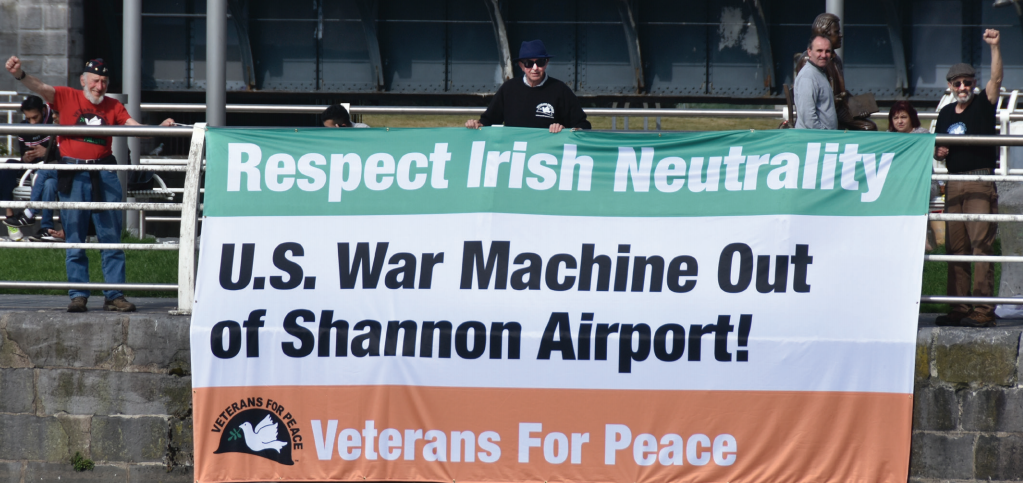
Shannon Airport Preace Trespassers
Face a Third Day of Their Trial in Ireland
Ellen Davidson / StopTheseWars & World BEYOND War
(April 28, 2022) — Both prosecution and defense wrapped up their cases today in the case of the Shannon Two, two US military veterans who were arrested for entering the airfield at Shannon Airport on March 17, 2019.
Tarak Kauff, 80, and Ken Mayers, 85, went onto the airfield to inspect any aircraft associated with the US military that were at the airport. There were in fact three planes there at the time — a Marine Corps Cessna jet, and an Air Force Transport C40 aircraft, and one Omni Air International aircraft on contract to the US military that they believed carried troops and weapons through the airport on their way to illegal wars in the Middle East, in violation of Irish neutrality and international law.
The defendants are not contesting the fact that they created a hole in the airport perimeter fencing and entered the area without authorization. They say they did so for “lawful excuse,” in order to bring attention to the illegal transport of troops and weapons through the facility and to pressure authorities to inspect the planes, rather than accepting US diplomatic assurances that munitions are not moving through the airport.
Nevertheless, much of the prosecution’s case consisted of witnesses from the police and airport security recounting the details of the men’s actions and the response from authorities. During the course of this testimony, it became clear that the chartered Omni flights were commonly known to be carrying troops and that no airport security or police officials had ever searched those planes or any US military planes to determine if there were weapons or munitions on board.
The prosecution’s last two witnesses were Colm Moriarty and Noel Carroll, both from the Shannon Garda (police) Station. The two oversaw the interviews of Kauff and Mayers on the day of their arrest. The prosecutor read the transcripts of the interviews, which were confirmed by the two police officers.
The interviews show clearly the defendants’ intentions on entering the airfield. Both clearly explained that they were intending to inspect an Omni Air International flight that was on the ground at the time for troops or weapons.
Mayers said his authority was “the obligation of citizens to do what is right.” When asked about whether his actions put people in danger, he said, “I recognize that [by] unauthorized access to the airfield I created a small but finite element of danger, however, I know by allowing US military and CIA aircraft to pass through Shannon, the Irish government is certainly putting many innocent people in serious danger.”

Kauff was equally clear on his priorities. When asked if he understood what “criminal damage” was, he responded, “I think so. It is something that the United States military have been doing for a long time in massive amounts.” He described his “lawful business in Shannon Airport” that day this way:
“As a citizen of the United States and also as a veteran who has taken an oath with no expiry date to defend the Constitution against all enemies both foreign and domestic, and under international law, the Geneva Convention, I am legally mandated to oppose criminal activity of my own government, as were the Germans, who didn’t during World War II and the Nazi regime.”
Barrister Michael Hourigan opened the defense case by putting Mayers on the witness stand. Mayers described how his father had fought in World War II and the Korean War as a Marine, and so he “drank a lot of Marine Kool-Aid” growing up. He went through college on a military scholarship and joined the Marines when he graduated in 1958. Eight and a half years later he resigned his commission after seeing what was happening in Vietnam. He said the the Marines taught him that “the US was not the force for peace in the world I had been led to believe.”
He eventually joined Veterans For Peace, and he read to the jury the organization’s statement of purpose, which speaks of working nonviolently to end war as an instrument of foreign policy, among other goals.
Mayers explained that, although he knew he was probably violating a statute with his actions, he felt it was necessary to prevent greater harm. He cited the war in Yemen, which is supported by US equipment and logistics. “Even today, the people of Yemen are threatened with mass starvation,” he said. “Of all people, the Irish people should be aware of the importance of preventing this kind of mass starvation.”
He also noted that when planes from a belligerent country land in a neutral country, “that country has an obligation under international law to inspect [the plane].” He cited the 1907 Hague Convention on Neutrality requiring neutral countries to seize weapons from belligerent countries.
He described US use of Shannon for military purposes as “a great disservice to the Irish people,” and pointed out that the vast majority of Irish people favor neutrality for their country. “If we can contribute to the enforcement of Irish neutrality,” he said, “that can save lives.”
Mayers described his action as “the best opportunity we had to make an impact.” He said, “I felt that the consequences of violating that statute were to me personally not as great as the consequences of not violating that statute.” Invoking the US civil rights movement of the 1960s, he said, “Direct action by the citizenry ultimately is what produces change,” change that will not come about “without continued and forceful intervention by citizens.”

On cross examination, prosecuting barrister Tony McGillucuddy asked Mayers whether he had attempted other measures to get the planes at Shannon Airport inspected, such as petitioning public officials or asking police to do so. He cut Mayers off when he attempted to explain why he had not explored these avenues in this case, but in redirect, Mayers was allowed to explain that he was aware of many attempts by Irish activists to go through all the channels mentioned by the prosecutor, and that most of these efforts did not even receive a response from officials, much less any action.
The second and last defense witness was Tarak Kauff, who, in contrast to Mayers’ measured tone even in the face of intense and sometimes hostile questioning by the prosecutor, expressed passionately his frustration and anger with US military use of Shannon.
Under questioning from defense barrister Carol Doherty, Kauff described joining the army at the age of 17 and getting out in 1962, just as US involvement in the Vietnam War was escalating. He became an antiwar activist, citing his “responsibility as a human being and also as a veteran to object and oppose this warmaking.”
He first learned about US military involvement at Shannon Airport in 2016, from veterans who were launching Veterans For Peace Ireland. “I believed it was my moral and human responsibility … to bring attention to this issue,” especially when children are dying, he stated. When asked about breaking the law with his actions, he said, “I’m talking about international law, war crimes, unlawful wars. It’s everyone’s responsibility.”
Kauff returned to Ireland in 2018 for a peace conference, and at that time engaged in a protest inside the Shannon terminal, using the same banner he and Mayers carried out on the airfield in 2019. Asked whether he thought that had been effective, he said, “Somewhat,” but that the planes were still coming through Shannon.
He compared them to the urgency of breaking into a burning building to rescue children inside: “What the US was doing, with the compliance of the Irish government,” was like a burning building.

On cross-examination, McGillicuddy pointed out that Kauff had cut a hole in the airport fence, to which he responded: “Yes I did damage the fence, I was acting on my own moral beliefs,” he said. He also pointed out that “the US government and the Irish government have been breaking the law. Irish people are sick and tired of their government kowtowing to the US That is the issue here!”
“There’s a higher purpose here than the law which says you can’t trespass, that you can’t cut a fence,” Kauff said.
He spoke emotionally about how he personally knew veterans who had come through Shannon with their weapons, and also how veteran friends of his had committed suicide, unable to live with what they had done in the US wars in Afghanistan and the Middle East. “That’s the real damage.… Damaging a fence is nothing. Nobody died and I should expect that you should understand that as well.”
It is sometimes difficult to measure the effects of political activism, but it’s clear that Kauff and Mayers have lit a spark in the Irish movement for peace and neutrality with their actions at Shannon and the subsequent publicity when they were jailed for two weeks and then forced to stay in the country for another eight months before their passports were returned to them has lit a spark in the Irish peace movement.
When asked if he felt that his work for peace was effective, Mayers said that he had gotten “feedback from people who have been moved by what I’ve done.” He drew an analogy to the Grand Canyon, which he said was formed by countless drops of water. As a protester, he said, he felt “like one of those drops of water.”
The case, presided over by Patricia Ryan, continues with closing statements and jury instruction tomorrow.
Related News
Irish Examiner: Two octogenarian anti-war protesters tell court some things are ‘mandated by God’
Times of London: Shannon airport trespass trial told of ‘nicest and most courteous protesters’
TheJournal.ie: Men charged with trespass at Shannon Airport argue actions were legal under international law